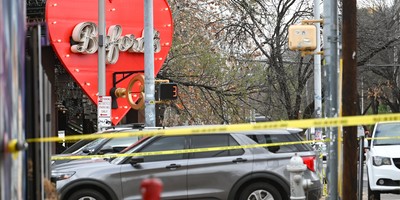It's time we 'fess up: Nobody has any idea how to get us out of the economic mess we're in. The Big Three automakers were on Capitol Hill again this week begging for a bailout. Treasury Secretary Henry M. Paulson is considering direct federal intervention into the mortgage market by subsidizing new loans at very low interest rates. The stock market continues its roller coaster ride, down hundreds of points one day, up hundreds the next. Meanwhile, President-elect Obama waits on the sideline with a financial team made up mostly of old Clinton hands, well respected but with only the traditional federal spending stimulus solution in their bag of fixes. No wonder most Americans are holding onto their wallets.
I've long been an advocate that Americans should save more and spend less on stuff they don't need, especially when it's paid for on high-interest credit cards. And a Christmas shopping trip this week to my local mall suggests a lot of people are doing just that.
Spending on Black Friday was up -- 7 percent, according to early estimates -- but by the following Tuesday, the Northern Virginia mall I visited was nearly empty. In past years, I've found plenty of company, but this time the stores were nearly deserted. Clerks stood around talking to each other, and there seemed to be fewer salespeople even in the high-end stores. The guy playing the piano in Nordstrom looked lonely; the barista at Starbucks seemed bored with no customers waiting to pay several bucks for a caffeine concoction. Sure, there were big sales signs and lots of tinsel decorations, but it hardly seemed like the holiday season.
Conventional wisdom says this is a bad thing. America's economy, after all, runs on consumer spending. If people aren't buying cars and washing machines, or even new cell phones and Blu-ray players, workers will lose jobs; we'll suffer a longer recession; and life will be more difficult for everyone.
But what if this short-term medicine, bitter though it may be, actually makes people behave more responsibly? Maybe those missing shoppers will pay down their credit card or home equity debt if they spend less on gifts this year. Maybe parents will decide that putting away money for college is better than buying their children that Wii set they've been begging for.
Recommended
Maybe kids will discover that the newest electronic gadget isn't half as much fun as the real thing. Maybe they'll even decide that throwing a real football in the park is better than watching some digitized Tony Romo complete a pass on their game screen. Who knows, a little financial belt-tightening could result in real-life belt-tightening as kids get off the couch and play off those extra pounds they've put on in the digital age.
I know elected officials -- especially the new Democratic crew about to flood Washington -- want Americans to get out there and spend. But we may be smarter than our politicians. It is not such a bad thing that everyone is looking to pare back their lifestyles. The path we were on was simply unsustainable in the long run.
Those bigger houses most of us couldn't really afford required more energy to heat and cool, and many of the lots they were built on were farther away from where we worked, requiring longer commutes and more gasoline. We had fewer hours to enjoy our homes because we worked and commuted more hours to pay for them. Worse, we spent less time with our kids and spouses. Do we really want to continue this vicious cycle, buying more but having less time to enjoy what we have?
I don't claim to know what will happen to the economy over the next year -- and surely the news right now doesn't look promising. But I do think that if we take better control of our own lives and redirect our individual priorities, we'll be better off in the future. Who knows, scaled-back holiday spending could remind us what the season is all about. Giving of ourselves is more important than handing out store-bought goodies. Time spent with loved ones may be the best gift of all.

























Join the conversation as a VIP Member